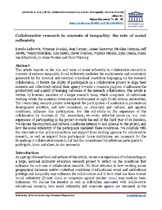| dc.contributor.author | Leibowitz, Brenda | |
| dc.contributor.author | Bozalek, Vivienne | |
| dc.contributor.author | Farmer, Jean | |
| dc.contributor.author | Garraway, James | |
| dc.contributor.author | Herman, Nicoline | |
| dc.contributor.author | Jawitz, Jeff | |
| dc.contributor.author | McMillan, Wendy | |
| dc.contributor.author | Mistri, Gita | |
| dc.contributor.author | Ndebele, Clever | |
| dc.contributor.author | Nkonki, Vuyisile | |
| dc.contributor.author | Quinn, Lynn | |
| dc.contributor.author | van Schalkwyk, Susan | |
| dc.contributor.author | Vorster, Jo-Anne | |
| dc.contributor.author | Winberg, Christine | |
| dc.date.accessioned | 2018-06-12T07:30:49Z | |
| dc.date.available | 2018-06-12T07:30:49Z | |
| dc.date.issued | 2016 | |
| dc.identifier.citation | Leibowtiz, B. et al. (2016). Collaborative research in context of inequality: the role of social reflexivity. Higher Education, 74: 65 – 80. | en_US |
| dc.identifier.issn | 0018-1560 | |
| dc.identifier.uri | http://dx.doi.org/10.1007/s10734-016-0029- | |
| dc.identifier.uri | http://hdl.handle.net/10566/3800 | |
| dc.description.abstract | This article reports on the role and value of social reflexivity in collaborative research in contexts of extreme inequality. Social reflexivity mediates the enablements and constraints generated by the internal and external contextual conditions impinging on the research collaboration. It fosters the ability of participants in a collaborative project to align their interests and collectively extend their agency towards a common purpose. It influences the productivity and quality of learning outcomes of the research collaboration. The article is written by fourteen members of a larger research team, which comprised 18 individuals working within the academic development environment in eight South African universities. The overarching research project investigated the participation of academics in professional development activities, and how contextual, i.e. structural and cultural, and agential conditions, influence this participation. For this sub-study on the experience of the collaboration by fourteen of the researchers, we wrote reflective pieces on our own experience of participating in the project towards the end of the third year of its duration. We discuss the structural and cultural conditions external to and internal to the project, and how the social reflexivity of the participants mediated these conditions. We conclude with the observation that policy injunctions and support from funding agencies for collaborative research, as well as support from participants’ home institutions are necessary for the flourishing of collaborative research, but that the commitment by individual participants to
participate, learn and share, is also necessary. | en_US |
| dc.language.iso | en | en_US |
| dc.publisher | Springer | en_US |
| dc.subject | Collaboration | en_US |
| dc.subject | Educational research | en_US |
| dc.subject | Corporate agency | en_US |
| dc.subject | Social reflexivity | en_US |
| dc.subject | Professional development | en_US |
| dc.title | Collaborative research in contexts of inequality: the role of social reflexivity | en_US |
| dc.type | Article | en_US |
| dc.privacy.showsubmitter | FALSE | |
| dc.status.ispeerreviewed | TRUE | |
| dc.status.ispeerreviewed | This is the author-version of the article published online at: http://dx.doi.org/10.1007/s10734-016-0029- | |
| dc.description.accreditation | IBSS | |

